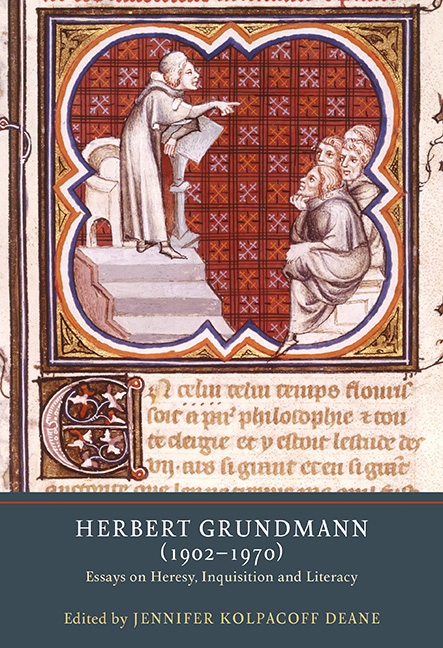Book contents
- Frontmatter
- Contents
- Acknowledgements
- Abbreviations
- Introduction
- Note on the Text
- 1 The Profile (Typus) of the Heretic in Medieval Perception
- 2 Women and Literature in the Middle Ages: A Contribution on the Origins of Vernacular Writing
- 3 Litteratus–Illitteratus: The Transformation of an Educational Standard from Antiquity to the Middle Ages
- 4 Heresy Interrogations in the Late Middle Ages as a Source-Critical Problem
- 5 Oportet et Haereses Esse: The Problem of Heresy in the Mirror of Medieval Biblical Exegesis
- 6 Learned and Popular Heresies of the Middle Ages
- 7 Obituary Essay (1970) by Arno Borst [annotations by Dr Letha Böhringer]
- 8 Bibliography of Herbert Grundmann
- Index
- YORK MEDIEVAL PRESS: PUBLICATIONS
2 - Women and Literature in the Middle Ages: A Contribution on the Origins of Vernacular Writing
Published online by Cambridge University Press: 19 March 2020
- Frontmatter
- Contents
- Acknowledgements
- Abbreviations
- Introduction
- Note on the Text
- 1 The Profile (Typus) of the Heretic in Medieval Perception
- 2 Women and Literature in the Middle Ages: A Contribution on the Origins of Vernacular Writing
- 3 Litteratus–Illitteratus: The Transformation of an Educational Standard from Antiquity to the Middle Ages
- 4 Heresy Interrogations in the Late Middle Ages as a Source-Critical Problem
- 5 Oportet et Haereses Esse: The Problem of Heresy in the Mirror of Medieval Biblical Exegesis
- 6 Learned and Popular Heresies of the Middle Ages
- 7 Obituary Essay (1970) by Arno Borst [annotations by Dr Letha Böhringer]
- 8 Bibliography of Herbert Grundmann
- Index
- YORK MEDIEVAL PRESS: PUBLICATIONS
Summary
Between the discovery of printing and the invention of radio, language and writing were so closely combined that the concept of ‘literature’ covered all linguistic creations and forms. It was only under ‘literature’, and along its margins, that mere speech or expressions that were ‘not yet literature’ existed. And speech was so little heeded or valued as a subject worthy of intellectual effort that the same term applied for ‘speaking’ as for literature. That ‘speech’ was not and did not need to be ‘writing’ was often all that would be said about it; that poetry achieved its effect through word and language, not text and reading, was increasingly forgotten in the reading centuries. Only in certain individual genres of artistic word usage did the distinction not entirely vanish, as it shaped how a listener or reader would grasp the presentation or book. The fact that drama was still spoken and heard rather than simply read – as was once the case for all poetry – seemed a shortcoming since mere ‘book dramas’ were not deemed ‘stage worthy’. Even if one finally becomes accustomed to reading drama, opera texts are usually a struggle, not to mention film scripts – even good film scripts. Many contemporary experiences make the differences between text and ‘spoken word’ even more palpable and clear: for example, the effect and linguistic power of political speeches strike the listener immediately but remain muted to the newspaper reader; the meaning and value of marching tunes and communal songs cannot be appreciated if only seen in print; and radio plays and musicals can certainly be good without being easily readable. The impact of language that does not pass through the detour of script or book is unmistakeably expanding today; that the listener is resuming his place alongside the reader cannot fail to have an effect on our language and composition. Yet it also raises new questions for looking back on ‘literature’ and makes possible new insights into its historical meaning.
During the Middle Ages, ‘literature’ and composition, text and spoken word, were distinct to a much higher degree than today. The modern field of ‘literature’ can ignore this fact because, for us, only the text survives; we only know poetry so far as it became literature.
- Type
- Chapter
- Information
- Herbert Grundmann (1902–1970)Essays on Heresy, Inquisition, and Literacy, pp. 30 - 55Publisher: Boydell & BrewerPrint publication year: 2019

